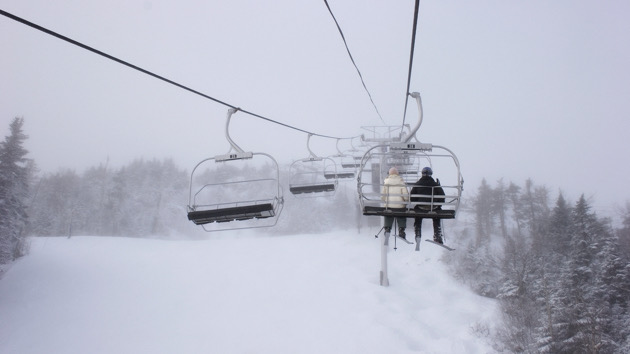(NEW YORK) — This past winter skiers rejoiced at the plethora of snow that fell as a result of several rounds of atmospheric rivers that pummeled the western U.S. with an onslaught of additional precipitation.
The extra snow led to record visitation for ski resorts in several regions in the U.S., according to a report by the National Ski Areas Association. Historically, fluctuations in skier visit numbers could be correlated with snowfall, with more snow generally leading to more skier visits, the report states.
The snow in the Rocky Mountains and Pacific Northwest contributed to the season’s strong numbers, the association said. Average area snowfall at national ski areas was 224 inches, a 30% increase over the 10-year average of 173 inches, according to the report. Some regions in the West have gotten more than 200% more snowpack than average, and several inches of snow were dumped in the San Gabriel Mountains and the San Bernardino County Mountains in California just last week. In Utah, some ski resorts hit 500 inches by the end of January.
There were 64.7 million skier visits — defined as every time a person uses a lift ticket or pass at a ski area — in the U.S. over the 2022-2023 winter season — a 6.6% increase over last year, according to the report. In addition, there were 481 operating ski resorts this season, compared to 473 last season.
In addition, the average length of the 2022-2023 ski season was also six days longer compared to last season — a total of 116 days.
The Rocky Mountain region reported a record-high season for the second year in a row with 27.9 million visitors, while the Pacific Northwest region also finished with its best year on record, totaling about 4.5 million visits. The Pacific Southwest also saw a season-over-season increase and had its third best year on record.
The association emphasized the numbers in the report are preliminary, as many ski resorts in the West have extended their seasons well into the spring.
The same could not be said for many ski resorts in the East, which experienced a record-mild winter. New York City did not see any measurable snow until the end of January — just half an inch of accumulation — while the Niagara Falls boat tours opened the earliest it ever has in a season due to minimal ice cover over Lake Erie.
While the Northeast had an increase in visitors from last year, the Southeast and Midwest reported small decreases in skier visits compared to 2021-22.
Several ski resorts in the East were forced to close early. The Cockaigne Resort in upstate New York closed in February, after getting just 35 to 37 inches of snow this past winter, according to its website.
Paoli Peaks, a ski resort in Orange County, Indiana, shuttered early in February after only getting 13 inches on the season, about half its normal accumulation, while Ober Mountain in Tennessee had less than half of its typical 40-inch base at the end of its season, which also closed early.
Even more resorts in the East experienced temporary closures during warm spells in the middle of winter.
Skier visits are a key performance indicator for the ski industry, with two consecutive seasons of record visitation signaling that the U.S. ski industry is healthy and that the demand for outdoor recreation is strong, according to the association.
Growing options of season passes and frequency products and an increased desire to get outside — especially among lapsed skiers who have returned to the slopes since the pandemic — also contributed to the record ski season, the report states.
ABC News’ Tracy Wholf contributed to this report.
Copyright © 2023, ABC Audio. All rights reserved.






